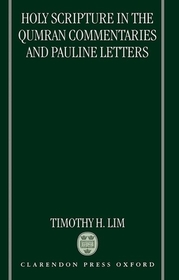
Holy Scripture in the Qumran Commentaries and Pauline Letters
-
10% KEDVEZMÉNY?
- A kedvezmény csak az 'Értesítés a kedvenc témákról' hírlevelünk címzettjeinek rendeléseire érvényes.
- Kiadói listaár GBP 125.00
-
59 718 Ft (56 875 Ft + 5% áfa)
Az ár azért becsült, mert a rendelés pillanatában nem lehet pontosan tudni, hogy a beérkezéskor milyen lesz a forint árfolyama az adott termék eredeti devizájához képest. Ha a forint romlana, kissé többet, ha javulna, kissé kevesebbet kell majd fizetnie.
- Kedvezmény(ek) 10% (cc. 5 972 Ft off)
- Kedvezményes ár 53 747 Ft (51 188 Ft + 5% áfa)
Iratkozzon fel most és részesüljön kedvezőbb árainkból!
Feliratkozom
59 718 Ft

Beszerezhetőség
Megrendelésre a kiadó utánnyomja a könyvet. Rendelhető, de a szokásosnál kicsit lassabban érkezik meg.
Why don't you give exact delivery time?
A beszerzés időigényét az eddigi tapasztalatokra alapozva adjuk meg. Azért becsült, mert a terméket külföldről hozzuk be, így a kiadó kiszolgálásának pillanatnyi gyorsaságától is függ. A megadottnál gyorsabb és lassabb szállítás is elképzelhető, de mindent megteszünk, hogy Ön a lehető leghamarabb jusson hozzá a termékhez.
A termék adatai:
- Kiadó Clarendon Press
- Megjelenés dátuma 1997. szeptember 18.
- ISBN 9780198262060
- Kötéstípus Keménykötés
- Terjedelem240 oldal
- Méret 225x144x18 mm
- Súly 425 g
- Nyelv angol 0
Kategóriák
Rövid leírás:
Lim examines scriptural interpretations found in the scrolls excavated from the caves of Qumran, arguably the greatest manuscript discovery in Palestine of the twentieth century. What was the ancient interpreters' attitude to the biblical texts? Did they consider them `sacred' in the sense that the words were the inviolable utterances of God? Or did they when necessary modify and adapt holy writ for their own purposes? After fifty years of intensive research it must be asked just how these scrolls shaped the study of Bible interpretation in the Second Temple Period.
TöbbHosszú leírás:
What was the ancient exegetes' attitude to the biblical texts? Did they consider them `sacred' in the sense that the words were the inviolable utterances of God? Or did they when necessary modify and adapt holy writ for their own purposes? This book examines the question of exegetical modifications from the post-Qumran perspective of textual pluriformity of literalism that runs through ancient exegeses and translations. The Qumran Commentators and Paul complemented their fulfilment-exegeses by paying close attention to the verbal formations of the biblical texts. The hermeneutical principles underlying their exegeses involved a multiplex of competing forces that at the same time sought to make scripture relevant while guarding it from changes. In so far as the label 'post-biblical exegesis' describes a clear separation between the written, authoritative texts and its interpretation, the distinction is overdrawn, for the ancients were not merely commentators, but also in some sense authors of the biblical texts.
Lim's book is a helpful stage along the way of understanding the role and authority of the biblical text in the Second Temple period.




